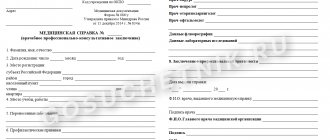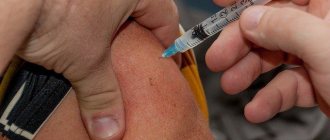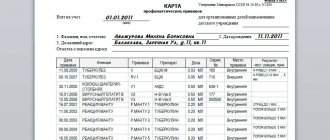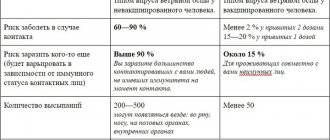Over the period of its existence, humanity has accumulated in its arsenal a mass of dangerous and sometimes incurable diseases, most of which are infectious. Therefore, the problem of vaccination against the most serious and endemic infections has not lost its relevance to this day. However, when proposing to carry out this or that manipulation to acquire immunity, it is necessary to display the information in certain documents. Registration form 156/u-93, called a vaccination certificate, helps with this. Information on required vaccinations is also available on the vaccination card - f. 063/у. These documents are approved in the relevant orders and are equivalent.
Vaccination history from birth and throughout life
In the same way as an outpatient card or medical history is created, a vaccination history is drawn up in medical institutions. Such a document is very important, and information is entered into it almost from the first days of life.
So, even before being discharged from the maternity hospital, the newborn is vaccinated against tuberculosis infection and hepatitis B. Then he will be observed by a pediatrician and a nurse at his place of residence, and information about the preventive injections performed will be transferred to the appropriate children's clinic. In her vaccination office, a card is created in which data on all vaccinations is entered, indicating the date, name and type of vaccine, number, etc. Injections and other measures for preventive purposes are certified by the signature and personal seal of the doctor.
Attention! If young parents have questions about vaccinating their babies, they should contact the maternity hospital or clinic for a certificate of vaccinations.
Being still quite a baby, the baby does not go to a nursery or other institution, and all manipulations are carried out during a visit to the clinic. When registering their child for kindergarten, parents go to the clinic. They create form 030/у, which contains information about vaccinations. Next, the grown-up child is sent to school, and at the same time medical documentation is transferred. From there, the materials go to the adolescent office and, upon reaching 18 years of age, to the clinic for adults.
Children's institutions are served by health workers (doctors and nursing staff) who are associated with the outpatient service where the baby is registered. Information about vaccinations is contained in several documents: it is identical and, for convenience, is duplicated in the vaccination certificate, f. 030/u, for girls - in the antenatal clinic, for boys - in the papers of the regional military registration and enlistment office.
Over the past decades, another format has been approved that is more convenient for the population: a vaccination certificate. This will be discussed below.
Form 156/у-93
Many are still asking questions: “What is a vaccination certificate? Where can I get it? What is it for? From the moment of approval, it is issued to every child who visits the vaccination office of the clinic for the first time. And it already contains data on prevention from the maternity hospital. In the future, with each vaccination, the child’s parents should bring it and enter new information.
Standard form 156/u-93 has a passport part and pages with tables containing information about the state of the human immune system. In addition to the last name, first name, patronymic and address, the passport section contains a column about blood type and Rh factor. On this page the corner stamp of the medical institution that issued the certificate and its official seal are affixed.
On the remaining pages, in the appropriate columns, information about vaccinations and reactions to them is entered. Data on past infectious diseases and studies of immunity strength are recorded. The administered immunoglobulins are noted. Enter information about the Mantoux reaction. There are sections for vaccinations against flu and other infections.
Only medical workers have the right to fill out the vaccination certificate. Each entry is certified by the doctor’s signature and the seal of the medical institution (“triangle” - “For certificates and certificates of temporary incapacity for work”).
Vaccination certificate: purpose, convenience, what kind of information it contains
First of all, the child needs a certificate so that parents do not have any difficulties when registering for preschool and school institutions, sanatoriums, and holiday camps. Well, timely vaccinations, reflected in the certificate, will protect the baby from dangerous diseases.
Important! The certificate contains information about vaccinations. The following institutions have the right to issue items: outpatient clinics for children and adults, medical units, health centers, etc.
What is this – a vaccination certificate? The form, approved by the standards of the Ministry of Health of the Russian Federation, contains several sheets of A5 format:
- The first (title) page contains the child’s last name, first name, patronymic, his place of residence, indicating the address and contact numbers of the parents. Information about blood group and Rh is also recorded there. A stamp and a round seal are placed here. A separate column provides brief information about the standards of vaccinations and certification of medical devices.
- The second and third: like the subsequent ones, are presented in the form of tables. They contain columns about the current state of health of the child or adult, the presence of allergic conditions to the administration of vaccines, concomitant pathologies and contraindications, and the dynamics of the Mantoux test. This is followed by information about BCG (for tuberculosis) and protection against polio. The information is certified by the signature of the responsible person and the seal.
- Fourth and fifth: they contain information about injections that protect against whooping cough, diphtheria and tetanus. The table shows the names of injections that are not mandatory, but are performed according to indications in emergencies in limited areas. This is parvovirus, influenza.
- Sixth and seventh: filled in in case of endemic situations, taking into account the specifics of a particular area. Includes information about vaccination against mumps.
- Eighth: information about detected antibody titers (if any), intolerance to certain types of vaccines, existing contraindications, as well as the consequences of previously administered vaccinations.
- Ninth: contains columns on procedures against measles, mumps, rubella, hepatitis types “A” and “B,” and pneumococcal lesions.
The data is entered into the certificate by a specially trained and trained healthcare worker, who often also performs the injections.
Detailed data about the drug is entered into the required rows of the tables:
- name of the vaccine;
- series and number, expiration date;
- the number of milliliters in the administered dose of the drug;
- the corresponding number in dilution if the vaccine is in “dry” form (proportions).
The data is signed by the doctor and certified by the seal of the head physician.
Attention! A vaccination certificate is a personal official document of an individual, and, like a passport, is kept with him and not in a medical institution.
What does it look like?
Information about the vaccination performed is included in a special standard certificate. The form of such a document is approved by the Ministry of Health of Russia (order No. 220 of September 17, 1993). The certificate form and a sample for filling it out can be downloaded on the Internet or taken from a local clinic.
In the upper left corner the name of the institution is indicated - the Ministry of Health of the Russian Federation. In the right corner are codes according to OKUD, institutions according to OKPO.
The title of the document is located in the center. Below on the left is the date of registration. To the right it is indicated for which institution the certificate is issued. Below is the surname, patronymic, name of the person to whom the document is issued, address and date of birth of the person.
The table lists all the information about the vaccinations given:
- date of immunization;
- name of the drug;
- dosage;
- vaccine series;
- vaccination site;
- reaction.
It is important that the document is filled out correctly, without blots or strikethroughs. Otherwise it will be considered invalid.
Why do you need information about vaccinations?
As a rule, any person is engaged in one form of work or another. For some, it is associated with work in epidemiologically hazardous areas, when a healthy body and specific immunity are especially required.
If a person applying for a job has a vaccination certificate in his hands, then obtaining a medical book will not take much time and will not be difficult. The main thing is that the appropriate injections and manipulations are performed on time, and information about them is correctly entered into this document.
Useful tips
Sometimes you urgently need to get a vaccination certificate. Where to buy document form 156/u-93? Is it possible to obtain it illegally? It is worth saying that such fraud can cost a lot not only to the person who received the document fraudulently, but also to his close people. To prevent catastrophic situations, it is enough to take care of completing the document in advance.
If an employer requires you to submit a vaccination certificate along with other documents when applying for a job, it is recommended that you make a copy at the HR department, immediately certify it and give it back, just like a copy of your education diploma and copies of other documents permanently kept by their owner.
Requirements
You must first study the reminder about the sequence and forms of filling out the vaccination certificate located on the first page. Next, the health worker, guided by information from the primary source about vaccinations, will transfer the names of preventive vaccinations, filling out the data clearly in accordance with the columns.
Important! The issued certificate has the same legal significance as the corresponding card or vaccination certificate. Other certificates may be issued on its basis.
A properly executed paper is an individual document of this particular person and is stored in his hands, and not in a medical institution. There is no need to paste a photo there.
What motivates citizens to seek such a service?
In Russia, the pace of vaccination is quite low. According to data from open sources, the share of vaccinated people in the country does not exceed 10%. Moreover, in many countries this figure has already exceeded 20–30%.
For this reason, some regions of Russia are considering the possibility of introducing mandatory vaccination. This prospect frightens distrustful citizens; some do not want to get vaccinated. In addition, to speed up the pace of vaccination and motivate Russians, the authorities organized sweepstakes with substantial prizes. For example, in Moscow, a car will be raffled off among vaccinated people.
Drawing of a car for vaccination: how to participate and where to view the results Read more
All this pushes those who are absolutely not ready to get vaccinated to look for alternative ways and buy fictitious certificates.
It’s better to get a certificate sooner than to regret wasted time later
While the baby is with his parents, the issuance of the certificate is usually delayed. However, at the age of 18, young people's opportunities increase and their intentions may change. This is usually due to:
- travel outside the region, for example, a business trip to foreign countries (Africa, South American countries) with unfavorable epidemiological conditions;
- registration for studies, catering or harmful working conditions;
- military service;
- treatment in sanatorium conditions, hospitalization.
For young children, the issue of a certificate remains relevant when registering for kindergarten, school, or children's camp.
In the above cases, data on preventive vaccinations is always required. This procedure takes a long time. In addition to the fact that a significant part of it is spent on moving, the process of obtaining information is also delayed. The vaccination card is archived. It takes time to request it and process the actual vaccination certificate. As a result, the time spent on this kind of “red tape” becomes the culprit for a lost good position, missed vacation on a voucher, and the inability to enroll and start studying.
If lost or in disrepair
How to restore a vaccination certificate if lost? You will have to contact a children's clinic or other medical institution (unit) where all the information about vaccinations is available. The restoration process will be easier if, after the initial registration of the certificate, you make a certified copy of it. In this case, it is absolutely not necessary to contact a notary. Such a copy can be certified by a specialist from the personnel department of the place of work or an administrative employee of the medical institution that issued the certificate.
What to do when the certificate is irretrievably lost or damaged?
There are situations when a much-needed vaccination certificate is lost: it is taken out along with a cosmetic bag, purse, etc., or it becomes unreadable and becomes unusable due to some reason. There is a way out, and more than one.
The first option, which takes longer, is to contact a clinic or other medical institution at your place of registration that has this data.
The second is when a copy of this certificate remains. One feature: it must first be certified with a signature and the appropriate stamp. It is advisable to do this in advance, when the certificate has not yet been lost, otherwise difficulties may arise. Moreover, it is not necessary to contact a notary, but do everything with the help of a specialist in the human resources department at your place of work or an employee of the medical institution who issued the certificate.
It will be easier if you do everything in advance
This rule also applies to issuing a certificate of preventive vaccinations. Upon reaching adulthood, a person is transferred to an adult clinic. The children's outpatient registration and vaccination records are transferred to the archives of the children's clinic.
Quite often, school graduates temporarily or permanently change their place of residence - the reason for this is admission to an educational institution, getting a job, etc. And information about professional vaccinations ends up at a considerable distance from a person. Therefore, it is recommended to obtain a vaccination certificate before leaving the children's clinic, where, if necessary, you can get all the reliable information about the vaccination performed.
Otherwise, you will need to request a vaccination card from the archive. In this case, obtaining a certificate may take some time. And this can result in an overdue trip, the inability to start work and other negative consequences.
What difficulties do you encounter when obtaining a certificate?
Often a person applies for the issuance and execution of a certificate, but the hospital simply does not have the appropriate forms. The problem is easily solved: you can go to the nearest medical center and purchase it there. Blank forms are sold at newsstands and any office supply stores. It can be printed on a printer: samples of such forms are easy to find on the Internet.
How much does registration cost?
A passport for vaccinations done in public medical institutions is provided free of charge. All you need to do is purchase a blank form at a print kiosk. It costs between 30-40 rubles.
As for private medical centers, the fee for document processing varies widely. It depends on the status of the clinic and the list of required vaccinations. Price – from 1000 rubles.
Where to get a vaccination certificate depends entirely on the desire of the person. He can go to a public or private medical institution. The main thing is that a license to carry out vaccination procedures is issued. You should not trust those who claim that they will complete the document without administering vaccines. In this case, a person risks his health, and in some cases his life, if there is a high probability of becoming infected with dangerous viruses or bacteria in the region.
International certificate
The standard document approved by WHO is valid throughout the country. But when traveling abroad, you will have to issue a duplicate of it, following international requirements. For this purpose, a form in English is purchased.
The place of issue and the procedure for issuing an international certificate are the same as for a standard document. A book with information about past vaccinations, filled out in Russian, helps speed up the process.
Are electronic versions of certificates and declarations acceptable?
Electronic copies of certificates and declarations cannot serve as official documents confirming product compliance with established requirements.
In paragraph 12 of the Rules for the sale of certain types of goods, electronic versions are not provided among the acceptable documents indicating the safety of products.
At the request of consumers and other interested parties, it is necessary to provide originals or duly certified copies of permitting documents on conformity assessment. Electronic versions are suitable for informational purposes only and may be posted on websites or forwarded for display.








